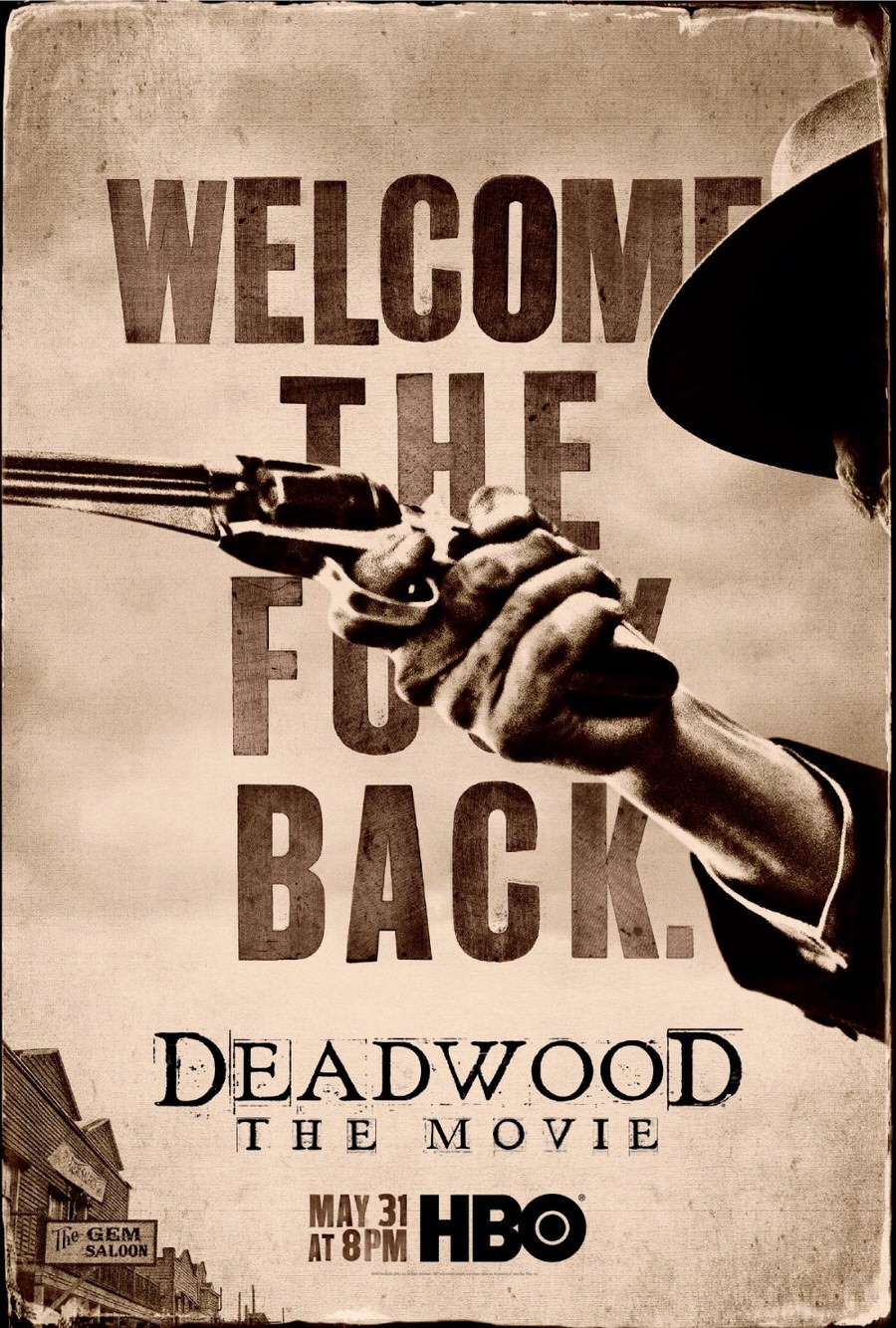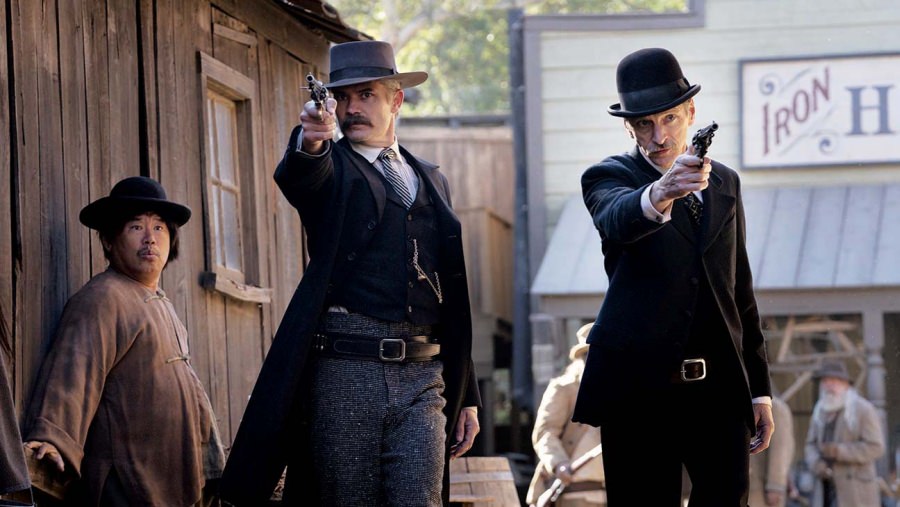Deadwood: The Movie
 It wasn’t until after I viewed Deadwood: The Movie that I discovered that Deadwood creator, author and longtime TV screenwriter David Milch (NYPD Blue) was diagnosed with Alzheimer’s disease before writing the script. This makes the HBO film even more elegiac than the film’s already poignant content. After being cancelled in 2006 after three seasons, the film, set ten years later, does its best to wrap up long-running storylines and subplots, and it does it satisfyingly. The film took so long to make that several of the series’ actors passed away, including magician Ricky Jay and Powers Boothe.
It wasn’t until after I viewed Deadwood: The Movie that I discovered that Deadwood creator, author and longtime TV screenwriter David Milch (NYPD Blue) was diagnosed with Alzheimer’s disease before writing the script. This makes the HBO film even more elegiac than the film’s already poignant content. After being cancelled in 2006 after three seasons, the film, set ten years later, does its best to wrap up long-running storylines and subplots, and it does it satisfyingly. The film took so long to make that several of the series’ actors passed away, including magician Ricky Jay and Powers Boothe.
Deadwood, the series, was known in many circles for its profane content, and profane it was, and is. Milch’s dialogue gives David Mamet’s raunchiness a run for its money, but Milch’s work has more poetry and it’s the mixture of the profane and the beautiful that gives many of his characters life (though not all of them talk like sailors — a town, after all, is composed of all sorts). At its best, his dialogue has a fascinating rhythm and cadence like no other fiction writing. Try on for size this heated exchange from DTM, between sheriff Seth Bullock (Timothy Olyphant) and entrepreneur George Hearst (Gerald McRaney):
Seth: Charlie Utter’s dead, Mr. Hearst. Murdered.
Hearst: Do we know by whose hand, Marshal, Mr. Utter has been taken?
Seth: Who pulled the trigger or who put the f___g money up to get it done?
Hearst: I take that, sir, as a slur meant to incite me. And I do not choose to be provoked. Your imputing foreknowledge, sir, to me of Mr. Utter’s murder exposes me to shameful slander and disesteem. I will have you recant. Or either ready to receive behavior from ’em in rebuke.
Or this sad but hilarious exchange between Calamity Jane and Tom, a saloon proprietor:
Tom: Welcome home, Jane.
Jane: ‘Scription to propose. Tombstone above a casket: “On this spot was Bill Hickok foully splayed, brains blown to bits by the coward Jack McCall! ‘Neath this building, too, days to come, will rest the remains of Jane Ardis Cannary, known as Calamity to strangers, and to Bill Hickok as a very good friend. At the place of his sorrowful demise, may Jane’s spirit stand vigilante watch as in life she found herself unable.”
Tom: And to speak straightforward, Jane, you mortally installed and decaying ‘neath this building don’t strike me as a magnet for commerce.
What lover of history hasn’t pondered what it would be like to travel in time and hear what conversations sounded like in, say, 1870? The Coen Brothers took a good stab at it in their superior remake of True Grit (2010), with dialogue more elaborate, complex and lyrical than any previous western. Milch works on the same principal, and even if the attempt to guess at what dialogue sounded like a hundred fifty years ago is, after all, only a guess, it still makes for compelling work.
TDM is a sort of meditation on the passage of time. In supplementary footage included on the DVD, Milch reads a poem written by his mentor, the novelist and poet Robert Penn Warren:
Tell me a story
In a moment and century, of mania
Tell me a story
The name of the story will be Time
But you must never say its name
Tell me a story of deep delight
Time has ravaged the faces of some of Deadwood‘s actors in this conclusion, but technological progress finally comes to the town. A train runs past what was once a plot of land which Colonel George Armstrong Custer discovered gold on. Telephone lines are being erected, South Dakota is entering into statehood, and George Hearst, the series’ hated villain and now a United States senator, has returned to buy more land. His attempts are complicated by former prostitute Trixie (Paula Malcomson), now pregnant with child and about to wed Seth Bullock’s business partner Sol Star (John Hawkes). Meanwhile, brothel-owner Al Swearengen (Ian McShane) has dissipated his body with incessant drinking over too many decades. He’s on the brink of death, but needs relied on to negotiate the precarious conflicts between Hearst, Bullock and Trixie.
 When Gunsmoke debuted on CBS TV in 1955 (after three years running as a radio program), it defied some viewer’s perception of what a western was. Gone were the singing cowboy and lighthearted, simple stories; Marshall Matt Dillon was hard-edged and wary (the series was originally conceived of as a film noir western), the pioneering life shown rougher than any previous show, and the threat of violence more imminent. Though the show veered away from brothel-owner Miss Kitty’s profession (the radio show was more frank), no viewer had to ponder long on how she made a living. The town’s doctor was a world weary cynic who made Star Trek‘s Dr. “Bones” McCoy look like a happy optimist.
When Gunsmoke debuted on CBS TV in 1955 (after three years running as a radio program), it defied some viewer’s perception of what a western was. Gone were the singing cowboy and lighthearted, simple stories; Marshall Matt Dillon was hard-edged and wary (the series was originally conceived of as a film noir western), the pioneering life shown rougher than any previous show, and the threat of violence more imminent. Though the show veered away from brothel-owner Miss Kitty’s profession (the radio show was more frank), no viewer had to ponder long on how she made a living. The town’s doctor was a world weary cynic who made Star Trek‘s Dr. “Bones” McCoy look like a happy optimist.
Deadwood upped the ante in historical accuracy of TV westerns. Newspapers published in Deadwood in the 19th century were studied, and most of the plots and characters from the show were drawn from primary sources. Wild Bill Hickok (played with quiet integrity by Keith Carradine) was indeed murdered in Tom Nutall’s saloon, and Calamity Jane (Robin Weigert) lived and died there as well. There was a real Al Swearengen (although the real Swearengen died a more violent and tragic death than the fiction version). And George Hearst was indeed a no-nonsense player in Deadwood: his 1878 Homestake mining operation produced gold until 2001; when Hearst acquired the San Francisco Examiner newspaper as payment for a gambling debt, it became the foundation of son William Randolph Hearst’s publishing empire, still going strong today.
Though I’d prefer that, after twelve years, Deadwood: The Movie had been longer than its 110 minutes, the bittersweet closure it brings to the series’ stories and characters also seem a closure to Milch’s career (though it’s to be hoped, of course, that more creative work from him can come forth). All the varied actors play their parts as if the the series had never ended — and also knowing it can no longer continue. The next “adult” western series to come along will surely need a unique and original vision in order not to be compared to this one.
—Michael R. Neno, 2020 Feb 25